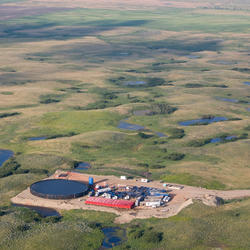Two Scientists Receive Early Career Excellence in Leadership Award
Middle School Students Visit USGS Laboratories
White House's My Brother's Keeper Day at the Lab
The U.S. Geological Survey (USGS) 2016 Early Career Excellence in Leadership Award was given to Dr. Denise M. Akob and Dr. Karl B. Haase. Drs. Akob and Haase have demonstrated outstanding leadership through their scientific accomplishments and service to the USGS.

USGS scientists Dr. Denise M. Akob and Dr. Karl B. Haase received the 2016 USGS Early Career Excellence in Leadership Award. The award recognizes outstanding acts, services, or achievements that exemplify and support the USGS goal of developing a leadership-centered culture. Together they created a weekly science seminar series and developed the USGS Reston Science Intern Program. Their combined efforts to encourage science communications and to create opportunities for other scientists, demonstrates the passion needed to advance the greater science community.
Denise and Karl are members of the Fate and Effects of Wastes from Unconventional Oil and Gas Development research team that's funded by the Toxic Substances Hydrology Program. Denise is a geomicrobiologist that studies how microorganisms impact their environment and in turn, how an environment impacts microorganisms. She is also the chief of the Reston Microbiology Laboratory, which conducts research in the fields of microbial ecology, geomicrobiology, biogeochemistry, and hydrogeology. Karl is a chemist that develops and refines methods for determining the age of groundwater and is active with the Reston Groundwater Dating Laboratory.
Related science listed below.
Energy Resources Life Cycle Integrated Science Team
Program Scientist Receives Meritorious Service Award
Trace Levels of Organic Chemicals Limited to Local Reaches of a Stream near an Oil and Gas Wastewater Disposal Facility
Examining Shifts in Stream Microbial Communities Exposed to Oil and Gas Wastewaters
Fate and Effects of Wastes from Unconventional Oil and Gas Development
The U.S. Geological Survey (USGS) 2016 Early Career Excellence in Leadership Award was given to Dr. Denise M. Akob and Dr. Karl B. Haase. Drs. Akob and Haase have demonstrated outstanding leadership through their scientific accomplishments and service to the USGS.

USGS scientists Dr. Denise M. Akob and Dr. Karl B. Haase received the 2016 USGS Early Career Excellence in Leadership Award. The award recognizes outstanding acts, services, or achievements that exemplify and support the USGS goal of developing a leadership-centered culture. Together they created a weekly science seminar series and developed the USGS Reston Science Intern Program. Their combined efforts to encourage science communications and to create opportunities for other scientists, demonstrates the passion needed to advance the greater science community.
Denise and Karl are members of the Fate and Effects of Wastes from Unconventional Oil and Gas Development research team that's funded by the Toxic Substances Hydrology Program. Denise is a geomicrobiologist that studies how microorganisms impact their environment and in turn, how an environment impacts microorganisms. She is also the chief of the Reston Microbiology Laboratory, which conducts research in the fields of microbial ecology, geomicrobiology, biogeochemistry, and hydrogeology. Karl is a chemist that develops and refines methods for determining the age of groundwater and is active with the Reston Groundwater Dating Laboratory.
Related science listed below.





